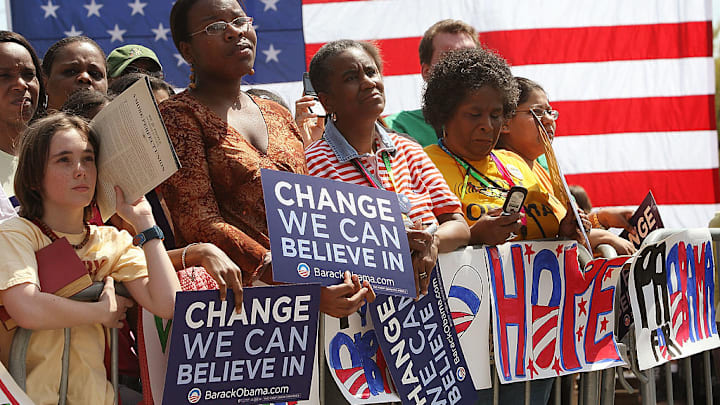In any election year, voters will be hit with an avalanche of campaign slogans meant to prop up the bona fides of the candidates. Let's revisit some slogans from elections past that helped the candidate move into the White House.
- A Chicken in Every Pot and a Car in Every Garage
- A Return to Normalcy
- Are you better off than you were four years ago?
- Tippecanoe and Tyler Too
- It Is Not Best to Swap Horses While Crossing the River
- Vote as You Shot
- Grandfather's Hat Fits Ben
- Would YOU buy a used car from this man?
A Chicken in Every Pot and a Car in Every Garage

This campaign slogan is firmly associated with Herbert Hoover’s presidential bids, but the Republican candidate did not actually say it. According to the Herbert Hoover Presidential Library and Museum, the phrase came from a 1928 newspaper ad paid for Republican business leaders that claimed that the party had restored the country to prosperity—the metaphorical chicken in the pot. “Republican efficiency has filled the workingman’s dinner pail—and his gasoline tank besides—made telephone, radio, and sanitary plumbing standard household equipment. And placed the whole nation in the silk stocking class,” it crowed. “Vote for Hoover.”
Hoover handily won the 1928 race, but by the time he ran for reelection in 1932, the country had fallen into the Great Depression. Democratic groups seized on the ad’s copy to suggest Hoover had failed to deliver on his chicken-in-every-pot promise. The message clearly landed among voters: Hoover lost to Democrat Franklin Delano Roosevelt with a tally of 59 to 472 electoral votes.
A Return to Normalcy

Returning to normal doesn’t sound like the most thrilling campaign slogan, but when you consider that it was Republican candidate Warren G. Harding’s 1920 commitment to the country just emerging from World War I, it probably sounded pretty good to voters. “America’s present need is not heroics but healing; not nostrums but normalcy; not revolution but restoration ... not surgery but serenity,” he said. The former newspaper publisher and erotic letter writer from Ohio crushed his Democratic opponent, James M. Cox, in a 404-127 electoral vote landslide.
Harding was also the first candidate to rely on the power of Hollywood to drum up votes: his backers included film stars Al Jolson, Mary Pickford, and Douglas Fairbanks.
Are you better off than you were four years ago?
Republican candidate Ronald Reagan posed this devastating question to the American people in a 1980 debate with Democratic incumbent Jimmy Carter. The candidates’ sole debate took place in the final week of the race, and until then, Carter's reelection looked plausible. After the debate, Carter plunged in the polls. Regan ended up winning the presidency with 489 electoral votes to Carter’s 49.
Tippecanoe and Tyler Too

Short-lived President William Henry Harrison used this slogan in his successful 1840 campaign as the Whig Party’s candidate. Tippecanoe refers to his decisive victory in an 1811 battle with Shawnee fighters near the Tippecanoe River in central Indiana. Soon after the fight, General Harrison became known as “Old Tip.”
Tyler alludes to his running mate, John Tyler, the former congressman, senator, and governor of Virginia. Less than two months after inauguration, Tyler became the first vice president to be sworn in as president after the death of his boss, saddling him with the nickname “His Accidency.”
It Is Not Best to Swap Horses While Crossing the River

Abraham Lincoln is widely credited with originating this folksy phrase in connection with his 1864 campaign for reelection. He used the metaphor in a speech before the National Union League, whose members congratulated him at the White House on his second Republican Party nomination in the race against his Democratic challenger, handsome former Union General George B. McClellan:
“I do not allow myself to suppose that either the convention or the league have concluded to decide that I am either the greatest or best man in America, but rather they have concluded that it is not best to swap horses while crossing the river, and have further concluded that I am not so poor a horse that they might not make a botch of it in trying to swap.”
The slogan (condensed to “don’t swap horses in midstream”) was reused by Democrats backing FDR in his 1940 and 1944 reelection campaigns, both of which were successful.
Vote as You Shot

In the 1868 election between Republican Ulysses S. Grant and Democrat Horatio Seymour, the GOP made no bones about it. If you were on the Union side in the Civil War, you’d better be voting for Grant, who has commanded all of the Union armies in the conflict.
In his 1872 reelection campaign, the incumbent chose a punny, less aggro slogan: "Grant us another term” [PDF].
Grandfather's Hat Fits Ben

Who else could this slogan be referring to but Benjamin Harrison, the grandson of William Henry “Old Tip” Harrison himself? The younger Harrison successfully deployed his nepo baby status as the Republican nominee in the 1889 presidential election against Democratic candidate Grover Cleveland. And maybe the hat did fit, but only for four years. After one term, Harrison was voted out of office in favor of the man who had also preceded him—Grover Cleveland.
Would YOU buy a used car from this man?

This rhetorical question may not have been John F. Kennedy’s official slogan in the 1960 election— he went with “A Time for Greatness” and “We Can Do Better”— but it’s definitely the funniest. His campaign used the phrase as the caption on a picture of his Republican opponent, Richard M. Nixon, looking especially smarmy, as though he was a huckster trying to sell the American people a lemon.
Read More Stories About Presidents:
A version of this story was published in 2008; it has been updated for 2024.
